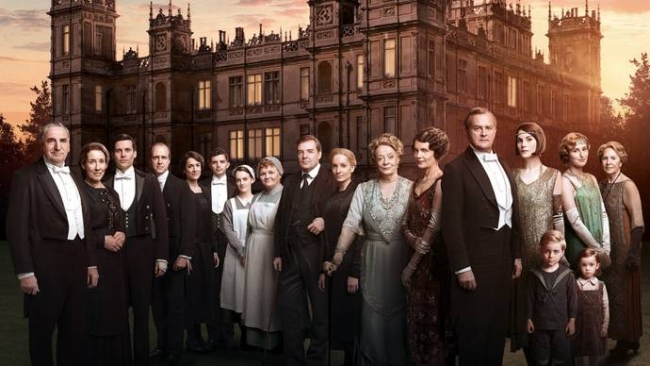You have /5 articles left.
Sign up for a free account or log in.

Masterpiece Theatre's Downton Abbey
PBS
I am a junior scholar with a secret: I enjoy Masterpiece Theatre’s British period drama Downton Abbey. Actually, “enjoy” is quite the understatement. And this is a very, very difficult thing for me to admit publicly.
You see, I do not watch much television. In fact, I do not even have a television. Like a “good” academic, I eschewed television watching quite some time ago and gleefully admit to this fact in certain circles -- as though a refusal to engage with popular culture by way of television watching is the academic’s badge of honor. If I watch anything at all, I stream it from my laptop as I deal with the mundane activities known to infiltrate daily life (e.g., washing dishes, chopping vegetables, folding laundry and so forth).
But I am practically addicted to Downton Abbey and can engage anyone in conversation about the brilliant characterization dreamed up and brought to life by its creator, Julian Fellowes. (Even Highclere Castle, the series’ setting, is a character in and of itself.) If I am so inclined, I can even be caught invoking a favorite line or two, as it suits my purposes (such as when the sassy cook, Mrs. Patmore, playfully suggests to the rigidly traditional butler, Mr. Carson, that if enjoying a candlelit dinner with his peers is “too democratically overpowering,” he is certainly free to explore other, less desirable options). In short, this series has left me actively refraining from counting the days until the sixth and final season airs in the States in January.
But why bring all this up?
As an academic, I find myself apologizing, or overexplaining, to other scholars my interest in this show should the topic arise. Clearly, the vast majority of the characters are white, and as such, it is not difficult to see my race represented, episode after episode. In fact, with few exceptions, race and racial diversity could not be further from the themes that carry through each season. The series mainly centers on class. Classist hierarchies, however fictionalized for ratings, dominate the narrative -- a detail consistent with the period in which the drama takes place. In conversations, I find myself explaining that I am quite “well aware of the racial and classist problematics,” as a way of introducing, framing and apologizing for my love of the show.
I am also what some might classify as a critical scholar. Indeed, critical race theory and critical whiteness studies are fields that have informed my dissertation, my research agenda, my scholarship, my work with preservice teachers and, frankly, my way of being in the world. A critical pedagogy in education is something for which I am a staunch advocate, and my life’s work involves teaching preservice teachers to deconstruct texts of all kinds for their racialized and oftentimes classist hidden curricula.
My musings about race in education have received mainstream attention, and I like to think that I am becoming more skillful at deconstructing my own positionality as a white scholar with significant unearned privilege, both socially and institutionally. I like to think that, year after year, article after article, conversation after conversation, I am becoming a bit more adept at what Professor Kevin Hylton of Great Britain’s Leeds Beckett University described in an article about critical race theory in Race, Ethnicity and Education (2012) as walking the walk, or “agitat[ing] for change and … [a willingness] to defend positions that are marginal, challenging and sometimes plain unpopular.”
Yet, in truth, my professional and scholarly life is often at odds with what sometimes occurs when I leave the classroom or the conference or put away whatever data I happen to be working with. And I find it utterly mystifying as to why an academic (or anyone, really) would have to defend the perfectly innocuous ways by which he or she experiences enjoyment.
The person’s defense often begins with three or four caveats explaining how he or she “absolutely knows how problematic [insert television show, movie, book, genre of music here] is,” and how “sorry” he or she is to have to admit this, but boy, does he or she enjoy [insert television show, movie, book, genre of music here]. It’s as though the only acceptable engagement with “less critical” forms of popular entertainment are those about which the problematic components are publicly acknowledged, or better yet, explicitly tied to critical research and teaching agendas -- as though we are not entitled to personal lives and downtime free from scholarly theories and deconstructive practices.
In truth, I find the entire dance utterly exhausting. I am acquainted with critical colleagues who enjoy rap and country music, graphic novels and reality television. I can quote, practically verbatim, the apologies and explanations that precede these admissions, as though enjoying, for example, Eminem’s music (however problematic, depending on whom you ask) somehow undermines one’s entire research agenda, academic accomplishments and larger professional goals. As though engaging certain texts for the sheer enjoyment of it is a dirty little secret, acceptable only in the context of acknowledged “problematic themes,” critical theories and apologies. My dear, dear colleagues, do trust: this is an exhausting way to be.
And so it is here that I will publicly vow to not be an exhausting academic when it comes to my colleagues’ interests. I look forward to hearing of your passions and hobbies -- perhaps they will become my own. Indeed, this is some of the stuff I live for. I relish in a catchy tune, a fun book or a television series that has inspired my own learning and inquiry into an era or topic about which I was only superficially knowledgeable before, however fictionalized for ratings.
And here is another dirty little secret for you: I read a romance novel recently and just loved it -- as in a bawling-into-my-blankets kind of love. And I assure you, my professional identity has not imploded, my years of teaching experience have not vanished into thin air and my Ph.D. has not burst into flames upon consumption.








